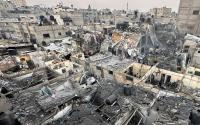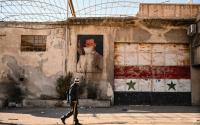26 July 2006Gush Shalom
- Who is winning this war?On the 15th day of the war, Hizbullah is functioning and fighting. That by itself will go down in the annals of the Arab peoples as a shining victory.When a featherweight boxer faces a heavyweight and is still standing in the 15th round - that is a victory, whatever the final outcome.
Can Hizbullah be pushed out of the border area?The question is based on a misunderstanding of the essence of Hizbullah.
Not by accident is the organization call Hizb-Allah ("Party of Allah") and not Jeish-Allah ("Army of Allah"). It is a political organization, with deep roots in the Shiite population of South Lebanon. For all practical purposes, it represents this community. The Shiites are 40% of the Lebanese population, and together with the other Muslims they form the majority.
Hizbullah can be "moved" only if the whole Shiite population is moved - an ethnic cleansing that (I hope) no one is thinking about. After the war the population will return to their towns and villages, and Hizbullah will continue to flourish.
What would happen if the Lebanese Army were deployed along the border?That has been one of the slogans of the Israeli government from the first moment. They will announce this as the main victory. That is very convincing - for anyone who has no idea about the complexities of Lebanon.
Anyone who was in Lebanon in 1982 and saw the Lebanese Army in action knows that it is not a serious army. Furthermore, many of its officers and soldiers are Shiites. Such a force will not fight Hizbullah.Its deployment in the South would depend entirely on the agreement of Hizbullah - and that also applies to every day it stays there.
Would an international force help?Ditto. That is a slogan especially tailored for diplomats, who look for an idea they can easily agree on. It sounds nice, especially if one adds the word "robust".
What exactly is the robust international force supposed to do?
It is proposed that it will remove Hizbullah from the border area. Not by words - like the hapless UNIFIL, that everyone ignored right from the beginning - but by force.
If the deployment of this force were to take place with the agreement of both sides - Israel and Hizbullah - alright. It may serve as a ladder for the Israeli government to climb down from the tree it has climbed up.
But if the force is placed there contrary to the will of Hizbullah, a guerilla war against it will start. Will the international force stand up and fight in a place which the mighty Israeli army fled with its tail between its legs?
For Israel, there will be a special dilemma: what will happen if Hizbullah attacks Israel in spite of the force? Will the Israeli army enter the area, risking a clash with the international force? With German soldiers, for example?
Olmert has said that we will not negotiate with Syria. Is that practical?So he said. He has said a lot of things, and his tongue is still wagging.
Syria is a central player in this field. No real settlement in Lebanon will succeed without the participation - direct or indirect- of Syria.
True, Hizbullah was created by us. When the Israeli army invaded Lebanon in 1982, the Shiites received the soldiers with rice and sweets. They hoped that we would evict the PLO forces, who were in control of the area. But when they realized that our army was there to stay, they started a guerilla war that lasted for 18 years. In this war, Hizbullah was born and grew, until it became the strongest organization in all Lebanon.
But this would not have happened without massive Syrian support. Syria wants to get back the Golan heights, which have been officially annexed to Israel. Therefore, it is important for the Syrians not to allow the Israelis any quiet. Since they do not want to risk trouble on their own borders with Israel, they use Hizbullah to cause trouble on Israel's border with Lebanon.
The Lebanese border will not become quiet until we reach an agreement with Syria. That is to say: until we give the Golan back.The alternativeis to start a war with Syria, with its ballistic missiles, chemical and biological weapons and an army that has proved itself. President Bush is pushing Israel to do this, perhaps in order to divert attention from his fiascoes in Iraq and Afghanistan.
How can one evaluate the conduct of the military campaign?Dan Halutz will not enter the history books as one of the greatest captains of all time.
He pushed the government into this war, partly in order to cover up two embarrassing military failures: the Palestinian commando action in Kerem Shalom and the Hizbullah action on the Lebanese border. No officer has been called to bear responsibility for them. The ultimate responsibility rests, of course, with the chief-of-Staff.
Halutz, the first Chief-of-Staff who rose through the ranks of the Air Force, was convinced that he could finish it off by aerial bombardment, with the assistance of the artillery and navy. He was vastly mistaken. Even after sowing havoc in Lebanon, he did not succeed in vanquishing the opponent. Now he is compelled to do the one thing that everybody was afraid of: sending large land forces into the Lebanese quagmire.
On the 15th day of the war, not one of the aims is any nearer to being achieved. As far as Halutz is concerned, both as a strategist and as a commander, his marks are close to zero.
Have the civilians at the head of the government proved themselves?After the elections, many people in Israel thought that a civilian era had begun, since both the Prime Minister and the Minister of Defense are complete civilians, without a military background. As it turns out, the opposite is the case.
History shows that political functionaries who succeed strong leaders are capable of doing terrible things. They want to prove that they, too, are strong leaders, that they have guts, that they can wage war. Harry Truman , who replaced Franklin Roosevelt, is responsible for what is perhaps the biggest war crime in history - the dropping of atom bombs on Hiroshima and Nagasaki. Anthony Eden, who succeeded Winston Churchill, started the foolish Suez war, in collusion with France and Israel.
The Olmert government started this war in shocking irresponsibility, without serious debate or deliberation. They were afraid to oppose the demands of the Chief-of-Staff, afraid to be branded as cowards.
Olmert has promised that after the war the situation in the region will be different from what it was before. Is there a chance of this?Absolutely. But the new situation will be very much worse for us.
One of Hassan Nasrallah's aims is to unite Shiites and Sunnis in a common fight against Israel.
One has to realize that for centuries Sunnis and Shiites were mortal enemies. Many orthodox Sunnis consider the Shiites heretics. By coming to the aid of the Palestinians, who are Sunnis, Nasrallah hopes, among other aims, to forge a new alliance.
In the Middle East, a new axis may be coming into being, one that includes Hizbullah, the Palestinians, Syria, Iraq and Iran. Syria is a Sunni country. Iraq is now controlled by the Shiites, who wholeheartedly support Hizbullah. But the Iraqi Sunnis, who are waging a tough guerilla war against the Americans, also support Hizbullah.
This bloc enjoys a wide popularity among the masses throughout the Arab world, because of their fight against the USA and Israel. The opposite bloc, which includes Saudi Arabia, Egypt and Jordan, is losing popularity by the day. These regimes are considered by the masses as mercenaries of the Americans and agents of Israel. Mahmoud Abbas is strenuously trying to avoid being included in this category.
So what can be done about this?To put an end to the Israeli-Palestinian conflict, which causes ferment throughout the Middle East.
To draw Hamas out of this hostile front, by negotiating with the elected Palestinian government.
To reach a settlement in Lebanon. For it to last, this settlement must include Hizbullah and Syria. This will oblige us to give the Golan back.
It should be remembered that Ehud Barak had already agreed to that and almost signed a peace treaty, similar to the one signed with Egypt, but unfortunately chickened out at the last moment for fear of public opinion.






